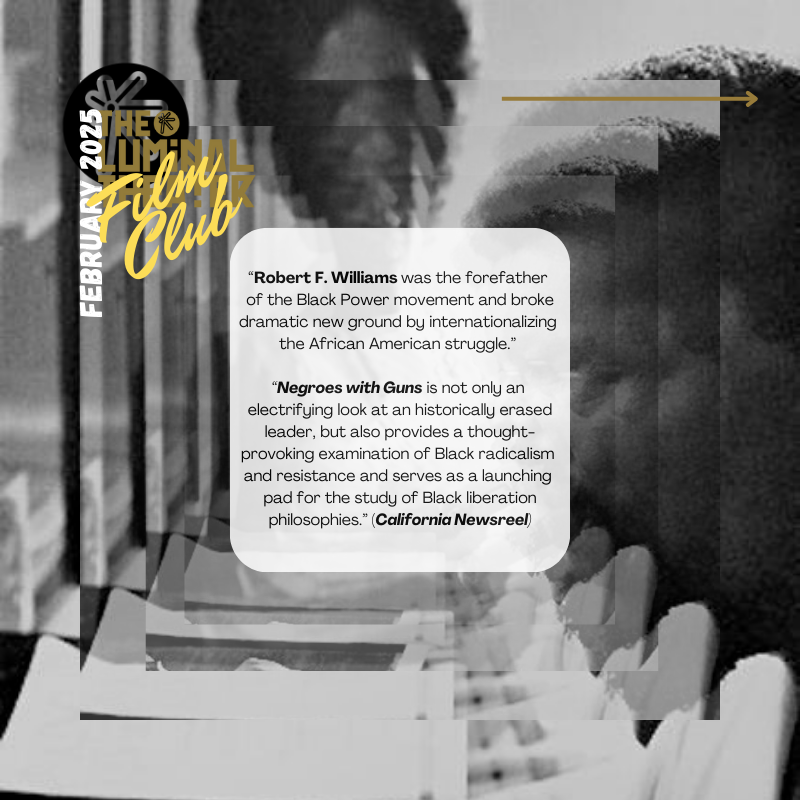FEBRUARY 2025, Rage & Rampage: Negroes with Guns (2005)
Robert Franklin and Mabel Robinson Williams came up during our September Revival Film Club, where Robert makes an appearance in Madeline Anderson’s short, “Integration Report 1”. I had never heard of the Williams’, so when our Director came across Negroes with Guns, I decided to open our 2025 Film Club with the film. Because, as you will come to see, their story is entirely too fitting for our present moment.
Expatriate living
Mabel and Robert are forced to leave the U.S. in the early 1960’s due to their political activism and community protection work. For one film club member, what is missing from our contemporary discourse is what Ms. Mabel brings up Negroes with Guns — that she was homesick while she lived abroad in Cuba and then China. So many of us are now openly wondering whether we should leave the country. But how do we ensure our ancestral and communal connections if we are required to make the must make the pivotal decision to migrate.
This point led us to discussing how one must travel as a comrade and a political expatriot, particularly as a politically Black family. We see a lot of travel influencing, where at best the idea of slow travel is encouraged. We wondered, how did Mabel and Robert establish, maintain, and nurture their comrades abroad to be able to facilitate their migration? This member put it succinctly: its about “the economy of travel vs. the economy of transnationalism”. And so it is.
We moved on to how each of us had heard about the Williams’s, if at all, before this film club. I just learned of the Williams’s at our September film club, and it was the same for another one of our members. Our new member, however, learned about the Williams from Dr. Tim Tyson, Professor of Practice in history at Duke University and author of the definitive text on the Williams’: Radio Free Dixie: Robert F. Williams and the Roots of Black Power. Inspired by the Williams’s seemingly being overlooked in primary narrative of Civil Rights and Black Power, I put together a bibliography of the Williams. Check it out at the bottom of this post if you’d like to learn more about them!
Gun Ownership
We then moved on to discussing how narratives around gun ownership are racialized and how we want to re-engage legacies of Black fun ownership, despite our fears. So I asked, what if watching Negroes with Guns could seed an intentional conversation around protection in our scarily politicized climate? How would we structure this conversation and which lessons do we take from the Williams’s themselves? One film club member started us off by pointing out how so much of Black gun ownership is about strategizing: “all the practices around guns and having guns in your life is about negotiations" were her words. The first thing we must do is acknowledge that Black womxn in particular are very averse to / against gun ownership.



Another film club member offered us this: the generations before us have done so much research and put so many things down on paper and in front of us. We are likely the most prepared generation for this moment. This includes, understanding how so much of gun ownership is as much about signaling power as exerting power.
For another film club member, Negros with Guns really surfaced deep-seated issues for them as a Black person. In fact, for them, this film speaks to very deep-seated issues for all Black(-American) folx. Think of Philando… doing all the right things! So there is so much deprogramming and healing that needs to be done. There is so much, “no, no, no, no, Black people do not go and get a gun and expect it to end well for you.” Part of this, this film club member reminds us, is how many of us are programming through the church to “turn the other cheek”. But also, what would our ancestors think of us carrying guns?
I offer this: so much about strategizing and the discussion around gun ownership is about protection and how much we lean on “control” to protect us. The third film club member wonders whether this conversation requires us to be able to come to terms with unity. But this also means we need to consider the ethics of engaging the media, given that so much of the stereotypes we have internalized around Black gun ownership are introduced and perpetuated through the media.
Control
We closed film club with discussing how guns and gun ownership are gendered. For one film club member, the point about guns being gendered…this is part of the block in Black folx understanding that we have the right to bear arms.
Domination…superiority… where we ended was here: that we have to be in active healing mode to be able to handle the responsibilities of owning a gun. Being clear and introspective about “why am I even picking up this gun?” We’re not getting to where we say we want to go without this work. For another film club member, this is about having a different, deeper understanding of mental health and balancing certain chemicals. Because, as they pointed out, Black elders such as Toni Morrison and Henry Louis Gates, Jr. have long been warning us that the timeline between gaining rights and the backlash is shortening.

![[FEB24]+Flyer+2a.png](https://images.squarespace-cdn.com/content/v1/5c1b0e30ee1759b620bb59fb/1747791203824-H72PCR8C8GQO314DFQUY/%5BFEB24%5D%2BFlyer%2B2a.png)
![[FEB24] Flyer 2b.png](https://images.squarespace-cdn.com/content/v1/5c1b0e30ee1759b620bb59fb/1747791244240-55T8DA0JHSEG5GA0U4LJ/%5BFEB24%5D+Flyer+2b.png)


![[FEB24] Flyer 1b.png](https://images.squarespace-cdn.com/content/v1/5c1b0e30ee1759b620bb59fb/1747791313429-ODFE1LWC8T75HRMH6YHB/%5BFEB24%5D+Flyer+1b.png)
![[FEB24] Flyer 1a.png](https://images.squarespace-cdn.com/content/v1/5c1b0e30ee1759b620bb59fb/1747791313407-HDNPC83KDC73VH2MEUFG/%5BFEB24%5D+Flyer+1a.png)

